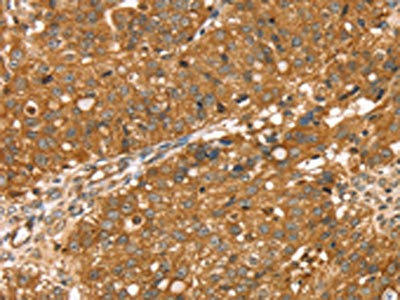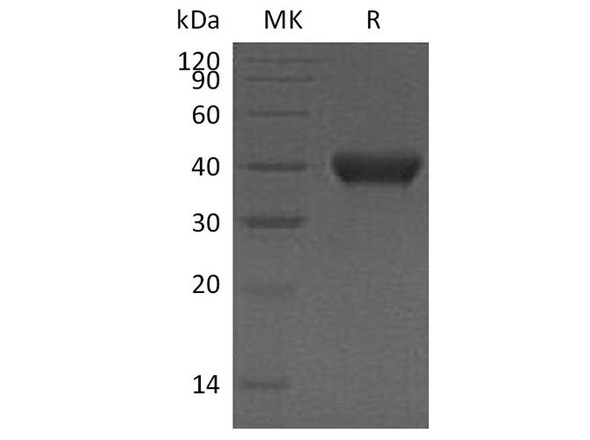Description
RNASET2 Antibody (PACO16983)
The RNA Set2 Polyclonal Antibody (PAC016983) is a valuable tool for research involving RNA Set2, a key player in epigenetic regulation of gene expression. This antibody, generated in rabbits, exhibits high specificity and sensitivity when used in various experimental applications, including Western blotting. It binds specifically to RNA Set2, enabling researchers to detect and analyze its expression levels in different biological samples and cell types.RNA Set2, known for its role in histone methylation and transcriptional regulation, is crucial for maintaining proper gene expression patterns and cellular functions.
Dysregulation of RNA Set2 has been linked to various diseases, including cancer and neurological disorders, making it an important target for further investigation. By understanding the functions and mechanisms of RNA Set2, researchers can gain insights into epigenetic regulation and potentially develop targeted therapies for related conditions.
| Antibody Name: | RNASET2 Antibody (PACO16983) |
| Antibody SKU: | PACO16983 |
| Size: | 50ul |
| Host Species: | Rabbit |
| Tested Applications: | ELISA, IHC |
| Recommended Dilutions: | ELISA:1:2000-1:5000, IHC:1:25-1:100 |
| Species Reactivity: | Human |
| Immunogen: | Fusion protein of human RNASET2 |
| Form: | Liquid |
| Storage Buffer: | -20°C, pH7.4 PBS, 0.05% NaN3, 40% Glycerol |
| Purification Method: | Antigen affinity purification |
| Clonality: | Polyclonal |
| Isotype: | IgG |
| Conjugate: | Non-conjugated |
 | The image on the left is immunohistochemistry of paraffin-embedded Human breast cancer tissue using PACO16983(RNASET2 Antibody) at dilution 1/30, on the right is treated with fusion protein. (Original magnification: x200). |
| Background: | This ribonuclease gene is a novel member of the Rh/T2/S-glycoprotein class of extracellular ribonucleases. It is a single copy gene that maps to 6q27, a region associated with human malignancies and chromosomal rearrangement. |
| Synonyms: | ribonuclease T2 |
| UniProt Protein Function: | RNASET2: Has ribonuclease activity, with higher activity at acidic pH. May play a role in cellular RNA catabolism. Defects in RNASET2 are the cause of leukoencephalopathy cystic without megalencephaly (LCWM). An infantile- onset syndrome of cerebral leukoencephalopathy. Affected newborns develop microcephaly and neurologic abnormalities including psychomotor impairment, seizures and sensorineural hearing impairment. The brain shows multifocal white matter lesions, anterior temporal lobe subcortical cysts, pericystic abnormal myelination, ventriculomegaly and intracranial calcifications. Belongs to the RNase T2 family. 2 isoforms of the human protein are produced by alternative splicing. |
| UniProt Protein Details: | Protein type:Secreted; Ribonuclease; EC 3.1.27.-; Secreted, signal peptide; RNA-binding Chromosomal Location of Human Ortholog: 6q27 Cellular Component: endoplasmic reticulum lumen; extracellular region; extracellular space; lysosome Molecular Function:ribonuclease activity Biological Process: RNA catabolic process Disease: Leukoencephalopathy, Cystic, Without Megalencephaly |
| NCBI Summary: | This ribonuclease gene is a novel member of the Rh/T2/S-glycoprotein class of extracellular ribonucleases. It is a single copy gene that maps to 6q27, a region associated with human malignancies and chromosomal rearrangement. [provided by RefSeq, Jul 2008] |
| UniProt Code: | O00584 |
| NCBI GenInfo Identifier: | 20139363 |
| NCBI Gene ID: | 8635 |
| NCBI Accession: | O00584.2 |
| UniProt Secondary Accession: | O00584,Q5T8Q0, Q8TCU2, Q9BZ46, Q9BZ47, B2RDA7, E1P5C3 |
| UniProt Related Accession: | O00584 |
| Molecular Weight: | 14,000 Da |
| NCBI Full Name: | Ribonuclease T2 |
| NCBI Synonym Full Names: | ribonuclease T2 |
| NCBI Official Symbol: | RNASET2 |
| NCBI Official Synonym Symbols: | RNASE6PL; bA514O12.3 |
| NCBI Protein Information: | ribonuclease T2 |
| UniProt Protein Name: | Ribonuclease T2 |
| UniProt Synonym Protein Names: | Ribonuclease 6 |
| Protein Family: | Ribonuclease |
| UniProt Gene Name: | RNASET2 |
| UniProt Entry Name: | RNT2_HUMAN |







